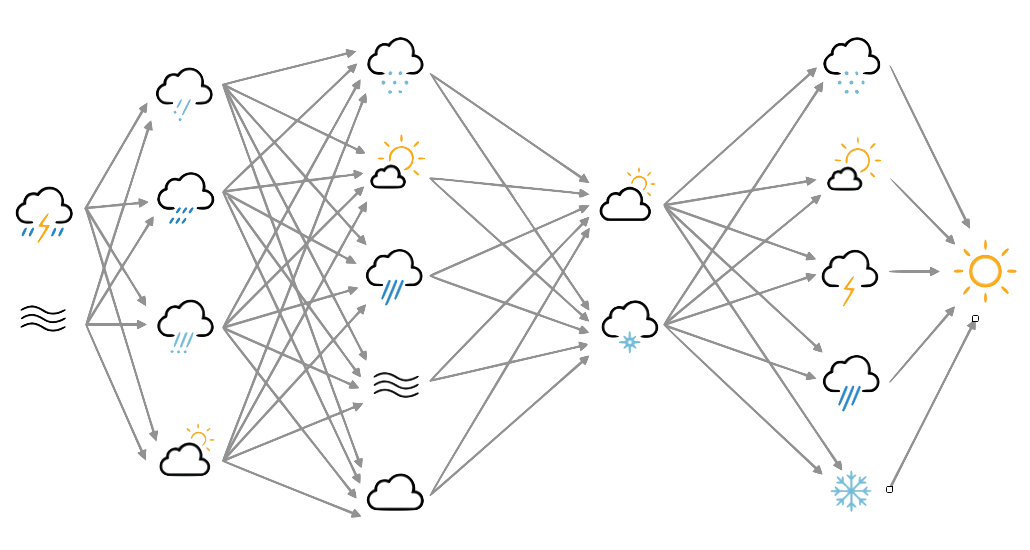Converting training data for use in TensorFlow¶
To train models on the downloaded data, we need to get it out of netCDF and into a file format that TensorFlow supports. This should probably be a TFRecord file but I was quite unable to work out how to use them, so I’m using individual files of serialised tensors.
The basic plan is:
- Each input file will contain the data for one variable, at one point in time, appropriately arranged and normalised for use by Tensorflow . (Making the file can be slow, using it should be fast, so do all conversions at this point).
- We want the input files to be independent, so only make one every five days or so, but arrange them to sample the annual and diurnal cycles uniformly. I make one set of files every 126 hours, through the test and training periods.
- The structure of these files should be matched to the model that is using them. Here, this means regridding to a resolution that works well with strided convolutions, and rotation to put the important parts of the world (the UK) in the middle.
- This makes a large batch of serialised tensor files, which can be combined into a TensorFlow Dataset for model training.
Script to make a single tensor file:
#!/usr/bin/env python
# Read in a field from 20CR as an Iris cube.
# Rescale it and move UK to the centre of the field.
# Convert it into a TensorFlow tensor.
# Serialise it and store it on $SCRATCH.
import tensorflow as tf
tf.enable_eager_execution()
import numpy
import IRData.twcr as twcr
import iris
import datetime
import argparse
import os
import sys
sys.path.append('%s/../../lib/' % os.path.dirname(__file__))
from normalise import normalise_t2m
from normalise import normalise_wind
from normalise import normalise_prmsl
from geometry import to_analysis_grid
import argparse
parser = argparse.ArgumentParser()
parser.add_argument("--year", help="Year",
type=int,required=True)
parser.add_argument("--month", help="Integer month",
type=int,required=True)
parser.add_argument("--day", help="Day of month",
type=int,required=True)
parser.add_argument("--hour", help="Hour of day (0 to 23)",
type=int,required=True)
parser.add_argument("--member", help="Ensemble member",
default=1,type=int,required=False)
parser.add_argument("--source", help="Data source",
default='20CR2c',type=str,required=False)
parser.add_argument("--variable", help="variable name",
default='prmsl',type=str,required=False)
parser.add_argument("--test", help="test data, not training",
action="store_true")
parser.add_argument("--opfile", help="tf data file name",
default=None,
type=str,required=False)
args = parser.parse_args()
if args.opfile is None:
purpose='training'
if args.test: purpose='test'
args.opfile=(("%s/ML_GCM/datasets/"+
"%s/%s/%s/%04d-%02d-%02d:%02d.tfd") %
(os.getenv('SCRATCH'),args.source,
args.variable,purpose,
args.year,args.month,args.day,args.hour))
if not os.path.isdir(os.path.dirname(args.opfile)):
os.makedirs(os.path.dirname(args.opfile))
# Load and standardise data
if args.source=='20CR2c':
ic=twcr.load(args.variable,datetime.datetime(args.year,args.month,
args.day,args.hour),
version='2c')
ic=ic.extract(iris.Constraint(member=args.member))
ic=to_analysis_grid(ic)
if args.variable=='uwnd.10m' or args.variable=='vwnd.10m':
ic.data=normalise_wind(ic.data)
elif args.variable=='air.2m':
ic.data=normalise_t2m(ic.data)
elif args.variable=='prmsl':
ic.data=normalise_prmsl(ic.data)
else:
raise ValueError('Variable %s is not supported' % args.variable)
else:
raise ValueError('Source %s is not supported' % args.source)
# Convert to Tensor
ict=tf.convert_to_tensor(ic.data, numpy.float32)
# Write to file
sict=tf.serialize_tensor(ict)
tf.write_file(args.opfile,sict)
To run this script for every required variable and timepoint:
#!/usr/bin/env python
# Make a few hundred tf data files
# for training the GCM models.
# Get one data file every 5 days+6 hours over the selected years
# They should be far enough apart to be mostly independent.
# Partition off 1/10 of them to be test data
# This script does not run the commands - it makes a list of commands
# (in the file 'run.txt') which can be run in parallel.
import os
import datetime
# Function to check if the job is already done for this timepoint
def is_done(variable,year,month,day,hour,group):
op_file_name=("%s/ML_GCM/datasets/20CR2c/%s/" +
"%s/%04d-%02d-%02d:%02d.tfd") % (
os.getenv('SCRATCH'),
variable,group,
year,month,day,hour)
if os.path.isfile(op_file_name):
return True
return False
f=open("run.txt","w+")
start_day=datetime.datetime(1969, 1, 1, 0)
end_day =datetime.datetime(2009, 12, 31, 23)
for variable in ('air.2m','prmsl','uwnd.10m','vwnd.10m'):
current_day=start_day
count=1
while current_day<=end_day:
if count%10==0:
if not is_done(variable,current_day.year,current_day.month,
current_day.day,current_day.hour,'test'):
cmd=("./make_training_tensor.py --year=%d --month=%d" +
" --day=%d --hour=%d --variable=%s --test \n") % (
current_day.year,current_day.month,
current_day.day,current_day.hour,variable)
f.write(cmd)
else:
if not is_done(variable,current_day.year,current_day.month,
current_day.day,current_day.hour,'training'):
cmd=("./make_training_tensor.py --year=%d --month=%d" +
" --day=%d --hour=%d --variable=%s \n") % (
current_day.year,current_day.month,
current_day.day,current_day.hour,variable)
f.write(cmd)
current_day=current_day+datetime.timedelta(hours=126)
count += 1
f.close()
This script produces a list of commands, which can be run in serial or parallel.
The insolation data requires slightly different treatment (every 6 hours for a year, rather than every 126 hours for 40 years), but the fundamental process is the same:
#!/usr/bin/env python
# Read in a field from 20CR as an Iris cube.
# Rescale it and move UK to the centre of the field.
# Convert it into a TensorFlow tensor.
# Serialise it and store it on $SCRATCH.
import tensorflow as tf
tf.enable_eager_execution()
import numpy
import IRData.twcr as twcr
import iris
import datetime
import argparse
import os
import sys
sys.path.append('%s/../../lib/' % os.path.dirname(__file__))
from normalise import normalise_insolation
from geometry import to_analysis_grid
import argparse
parser = argparse.ArgumentParser()
parser.add_argument("--year", help="Year",
type=int,required=True)
parser.add_argument("--month", help="Integer month",
type=int,required=True)
parser.add_argument("--day", help="Day of month",
type=int,required=True)
parser.add_argument("--hour", help="Hour of day (0 to 23)",
type=int,required=True)
parser.add_argument("--opfile", help="tf data file name",
default=None,
type=str,required=False)
args = parser.parse_args()
if args.opfile is None:
args.opfile=(("%s/ML_GCM/datasets/"+
"%s/%s/%s/%04d-%02d-%02d:%02d.tfd") %
(os.getenv('SCRATCH'),'20CR2c',
'insolation','training',
args.year,args.month,args.day,args.hour))
if not os.path.isdir(os.path.dirname(args.opfile)):
os.makedirs(os.path.dirname(args.opfile))
# Don't distinguish between training and test for insolation.
# Make a 'test' directory that's a copy of the 'training' directory'
tstdir = os.path.dirname(args.opfile).replace('training','test')
if not os.path.exists(tstdir):
os.symlink(os.path.dirname(args.opfile),tstdir)
# Load the 20CR2c data as an iris cube
time_constraint=iris.Constraint(time=iris.time.PartialDateTime(
year=args.year,
month=args.month,
day=args.day,
hour=args.hour))
ic=iris.load_cube("%s/20CR/version_2c/ensmean/cduvb.1969.nc" % os.getenv('DATADIR'),
iris.Constraint(name='3-hourly Clear Sky UV-B Downward Solar Flux') &
time_constraint)
coord_s=iris.coord_systems.GeogCS(iris.fileformats.pp.EARTH_RADIUS)
ic.coord('latitude').coord_system=coord_s
ic.coord('longitude').coord_system=coord_s
# Standardise
ic=to_analysis_grid(ic)
ic.data=normalise_insolation(ic.data)
# Convert to Tensor
ict=tf.convert_to_tensor(ic.data, numpy.float32)
# Write to file
sict=tf.serialize_tensor(ict)
tf.write_file(args.opfile,sict)
#!/usr/bin/env python
# Make a list of the commands needed to make a few hundred tf data files
# for training the autoencoder.
# Special case for insolation - all time points, one year.
import os
import datetime
# Function to check if the job is already done for this timepoint
def is_done(year,month,day,hour,group):
op_file_name=("%s/ML_GCM/datasets/"+
"20CR2c/insolation/" +
"%s/%04d-%02d-%02d:%02d.tfd") % (
os.getenv('SCRATCH'),group,
year,month,day,hour)
if os.path.isfile(op_file_name):
return True
return False
f=open("run.txt","w+")
count=1
start_day=datetime.datetime(1969, 1, 1, 0)
end_day =datetime.datetime(1969, 12, 31, 23)
current_day=start_day
while current_day<=end_day:
if not is_done(current_day.year,current_day.month,
current_day.day,current_day.hour,'training'):
cmd=("./make_insolation_tensor.py --year=%d --month=%d" +
" --day=%d --hour=%d \n") % (
current_day.year,current_day.month,
current_day.day,current_day.hour)
f.write(cmd)
current_day=current_day+datetime.timedelta(hours=6)
count += 1
f.close()
This process provides data for the autoencoder (where input is the same as output). Other models will require additional (but similar) data - the +6hour predictor, for example, requires the same data but with a 6hour offset applied.
Library functions used:
